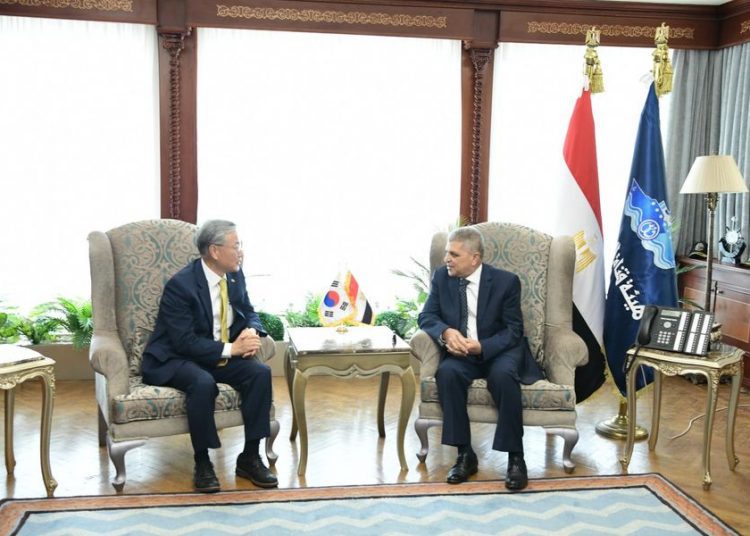Chairman of the Suez Canal Authority (SCA) Osama Rabie held a meeting on Sunday with South Korean Ambassador in Cairo Kim Yong-Hyun and his delegation.
During the meeting, the two sides discussed ways of boosting co-operation in various fields.
Rabie welcomed Ambassador Kim Yong-Hyun on his first visit to the Suez Canalsince he assumed his duties.
Rabie and Yong-Hyun agreed on continuing constructive co-operation between the Suez Canal Authority and South Korean companies operating in the maritime field, especially in areas related to green transformation.
Rabie said that the Suez Canal has started its first actual steps towards green transformation through promoting the use of clean energy in operating the transit guiding stations along the canal.
The Egyptian state is working on turning its 72-kilometre-long Suez Canal — the world’s longest man-made canal without locks — into a “green route,” a step that aligns with the country’s ambitious plans to become a transit route for clean energy, Rabie went on to say.
The sea-level canal, through which around 12 percent of the world’s trade passes, connects the Mediterranean and the Red seas, and is the shortest maritime route between Asia and Europe and the fastest crossing from the Atlantic Ocean to the Indian Ocean.
During the meeting, the SCA chairman reviewed development projects being implemented inthe canal.
The SCA aims to boost co-operation with South Korea in the localisation of green energy industry, as well as the fields of green fuel and ship refueling, Rabie said.
Rabieemphasised that the SCA has drawn up a comprehensive strategy to enhance canal’s competitiveness and raise its global rankingthrough the increase of its capacity and encouraging trade and investment through it, thus guaranteeing stable global supply chains.
The Suez Canal has always been a prime supporter of the national economy, given its distinguished geographical position on the global maritime navigation map.
Ships crossing the Suez Canal benefit from the eased measures, which have translated into a rise in the performance rates of the canal and brought in record returns of foreign currency despite the global crises.
For his part, South Korean Ambassador Kim Yong-Hyun voiced his appreciation for giant projects being carried out in both directions of the Suez Canal. He said that he would encourage South Korean businesspeople to invest more in the canal.
He said that the percentage of South Korea’s foreign trade exceeds 70%, which makes the Suez Canal a major gateway to South Korean trade.
The South Korean ambassador hailed the efforts made by the Egyptian government during the past few years to launch giant projects for developing infrastructure. He paid tribute to the development of the canal’s navigational course and digging the new Suez Canal, in addition to projects to develop the ports of the Canal region and its road network.






Discussion about this post